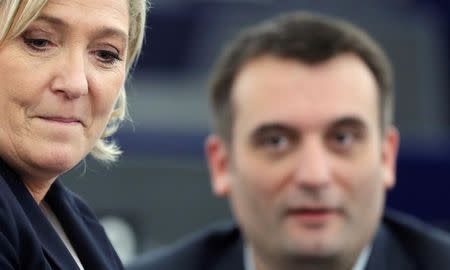Syria enters French election debate as Le Pen aide questions intelligence report
By John Irish and Matthias Blamont PARIS (Reuters) - A top aide of far-right presidential candidate Marine Le Pen raised doubts on Thursday about a French intelligence report accusing Syria's leadership of a toxic gas attack, a position directly opposed by her centrist rival Emmanuel Macron. A declassified report published on Wednesday showed that French intelligence had concluded that government-backed forces had launched a sarin nerve gas attack on April 4 in northern Syria. It also suggested Assad or members of his inner circle had ordered the strike on the town of Khan Sheikhoun, where scores of people were killed. "I think that the international community can doubt it as long as there isn't an international inquiry under the auspices of the United Nations," Florian Philippot, deputy leader of Le Pen's National Front party, told France Inter radio. "I have no way of saying if it's true or not, but the (international community) can doubt it because we've had precedents," he said, referring to 2003 when false intelligence prompted a U.S.-led invasion of Saddam Hussein's Iraq. The chemical attack prompted U.S. President Donald Trump to order a cruise missile strike on a Syrian air base. Assad denies his government has ever used chemical weapons and has also said Syria would only allow an "impartial" investigation into the poison gas incident. Russia, an Assad ally, vetoed a U.N. Security Council resolution on April 13 to condemn the chemical attack and push Damascus to cooperate with investigators. "WHAT'S PLAN B?" Contrary to her election rival Macron, Le Pen is opposed to current French policy in Syria, where Paris has backed Assad's opponents. She has described the Syrian leader as the "only viable solution" for preventing Islamic State from taking power in the country and called for a coalition with Russia. Trump's decision to launch the missile strike against Syria prompted rare criticism from Le Pen, who until then had viewed the new U.S. president as an ideological soulmate. "It is quite possible that it was the regime (who carried out the chemical attack), but what does that change? Do we still launch strikes? What's the plan B?" Philippot said. "Often in diplomacy it is not the choice between good and bad. It's the choice between the bad and the worst," Philippot said. "I think that Bashar is fighting Islamic State and I don't want a war between the United States and Russia. We need an international coalition." Syria's foreign ministry dismissed the French intelligence report on Thursday as "lies". "The Western states have become professional in the art of lying, deception and misleading to implement their policies in imposing hegemony on the world and to return to the era of colonization, mandate and guardianship," it said in a statement on Sana news agency. Macron, a former French economy minister, said on Wednesday he would support further strikes against Assad's chemical weapons' facilities. "If elected, I would take measures - in coordination with the (U.S.-led) coalition and if possible under a U.N. mandate, but even without - to neutralise the chemical capacities of Bashar al-Assad," he told reporters. French opinion polls suggest Macron will defeat Le Pen in the second-round runoff of the presidential election on May 7. (Additional reporting by Emmanuel Jarry; Editing by Andrew Callus and Gareth Jones)

 Yahoo News
Yahoo News 

